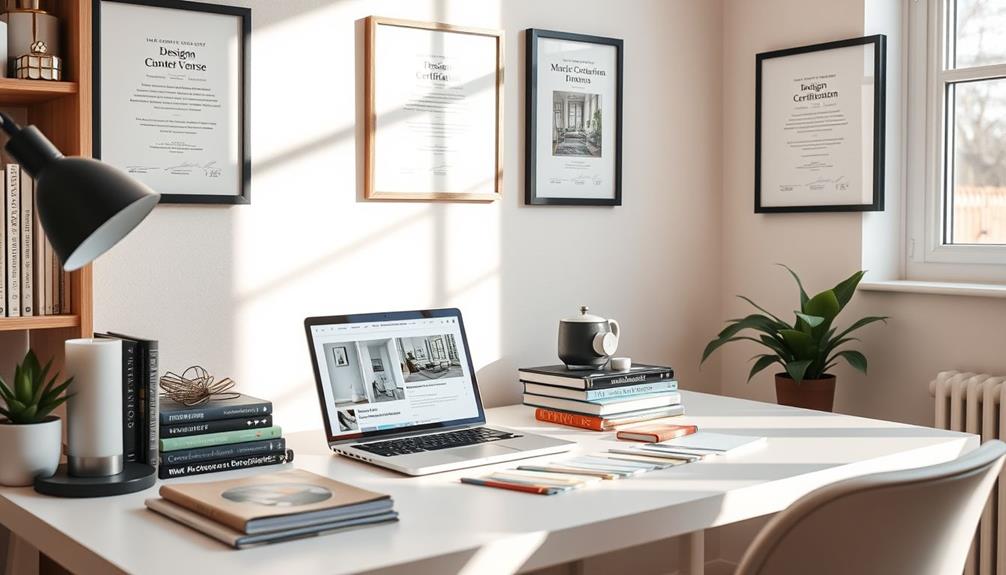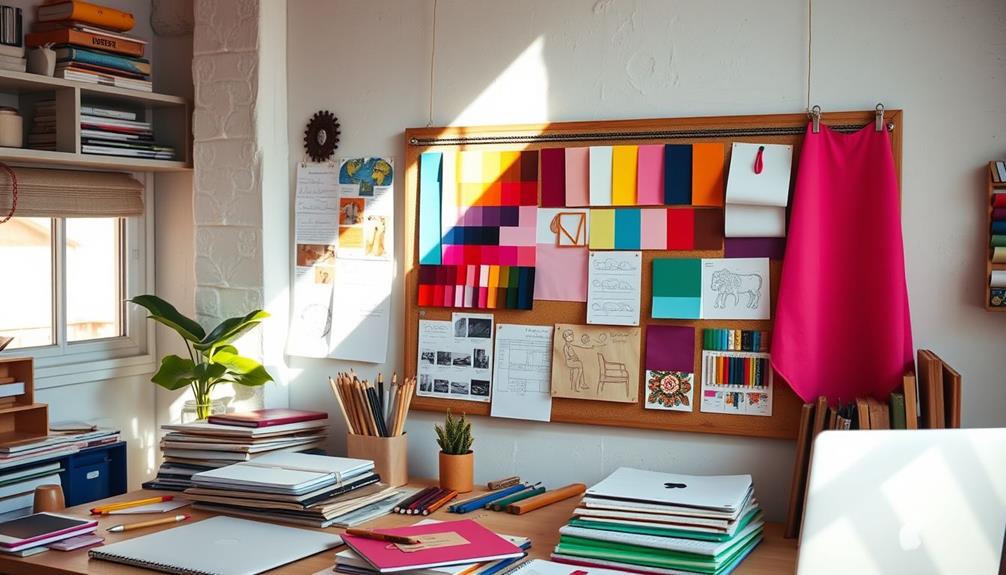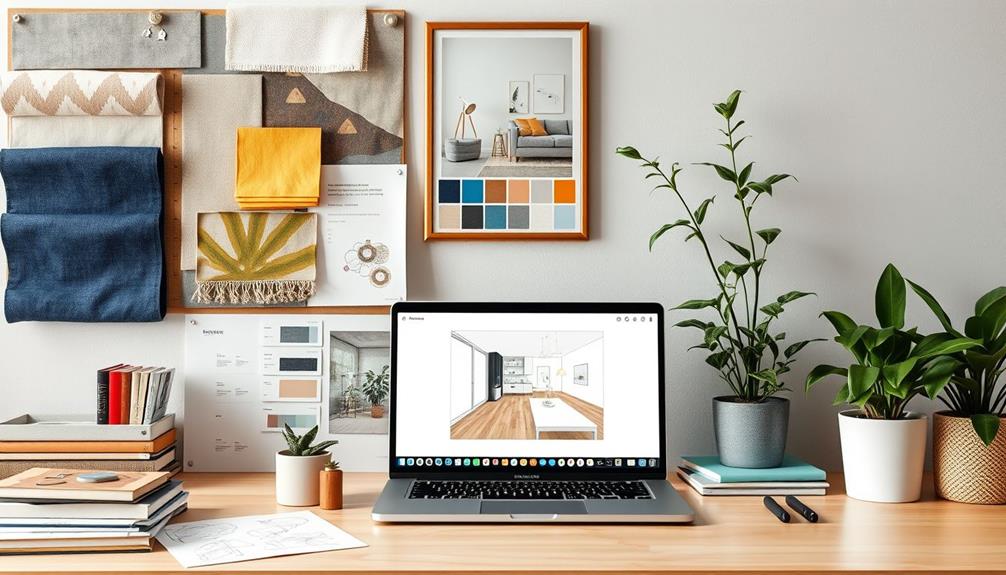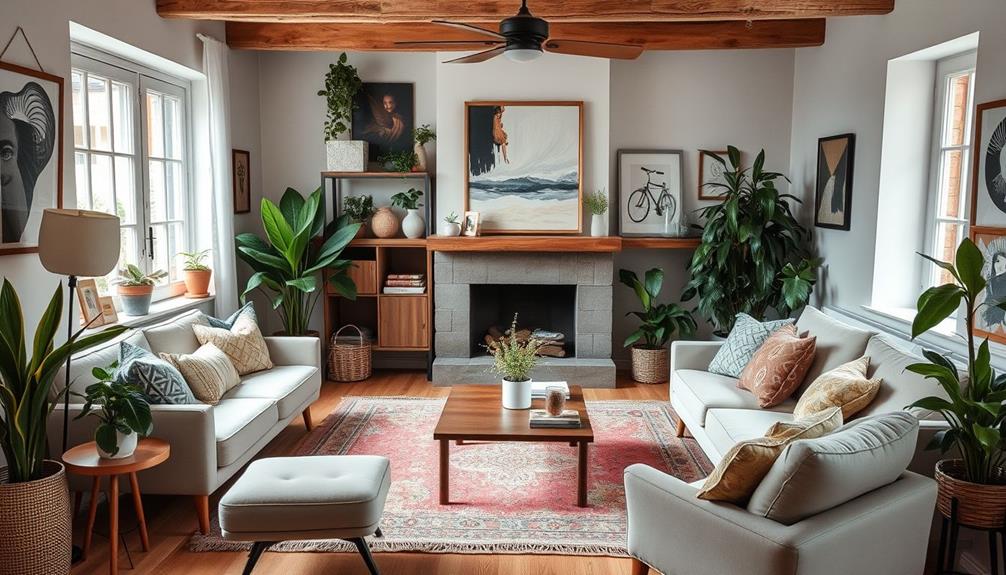To break into interior design, start by evaluating your skills and interests to define your career path. Consider obtaining a degree—many designers leverage a bachelor's for better opportunities. Gain practical experience through internships or entry-level positions, and work on your personal projects to build your portfolio. Master essential design software like AutoCAD and SketchUp, and enhance your project management skills. Networking is vital; attend industry events, join professional associations, and connect with established designers. With the right mix of education, experience, and connections, you'll position yourself for success in this vibrant field. There's much more to explore! To further develop your skills in interior design, consider taking additional courses or workshops to stay current with industry trends and techniques. Practice creating mood boards and design presentations to showcase your creativity and attention to detail. Additionally, research and learn how to style a living room to understand the balance of color, texture, and functional design elements. As you continue to grow and evolve in your career, always stay curious and open to new ideas and inspirations.
Key Takeaways
- Obtain a relevant degree in interior design and consider accredited programs to enhance job opportunities and meet licensing requirements.
- Gain practical experience through internships, volunteering, and entry-level positions to build confidence and industry insights.
- Develop essential skills in design software, project management, and communication to effectively collaborate with clients and vendors.
- Create a strong portfolio showcasing your design work and projects to attract potential employers and clients.
- Build a professional network by attending industry events, joining associations, and leveraging social media to connect with peers and mentors.
Assessing Your Design Aspirations

Evaluating your design aspirations is an essential step in starting a career in interior design. Begin by examining your design skills and interests, distinguishing between the roles of a decorator and a designer. This clarity helps you align your career aspirations with your passion, whether you prefer working in residential or commercial spaces.
Explore various career paths within the industry, including opportunities in design firms, project management, or materials sales. Understanding these roles enables you to target your efforts effectively. Set both short- and long-term goals for your interior design journey, but stay flexible to adapt to changes and new opportunities that may arise.
Engaging in internships and practical experiences before graduation is vital; these avenues provide firsthand exposure to the industry and help you build a robust portfolio.
A strong portfolio is key to enhancing your job prospects, showcasing your design skills and the projects you've worked on. By focusing on these aspects, you'll be well on your way to carving out a successful career in interior design, equipped with the knowledge and experience needed to thrive in this dynamic field.
Educational Routes and Certifications

Once you've clarified your design aspirations, it's time to reflect on how education and certifications can support your journey into interior design. A bachelor's degree in interior design typically requires four years of study and provides foundational knowledge in design principles and practices.
If you're looking for a quicker path, an associate's degree offers a two-year option. Many states mandate formal education from an accredited program to obtain a license, and passing the National Council for Interior Design Qualification (NCIDQ) exam is essential for certification. This exam consists of three parts—IDFX, IDPX, and practicum—covering critical areas like design application and ethics.
Researching programs accredited by the Council for Interior Design Accreditation (CIDA) can improve your job placement rates and guarantee a quality education. Notable programs at institutions like the University of Cincinnati and Cornell University stand out.
Additionally, pursuing certifications in specialized areas, such as sustainable design, showcases your commitment to industry trends and can enhance your career prospects. By focusing on education and certifications, you'll build a strong foundation for a successful interior design career.
Gaining Practical Experience

Gaining practical experience is essential for anyone looking to break into interior design. Start by seeking internships with established design firms; these opportunities provide invaluable hands-on experience and mentorship, helping you build vital skills and industry knowledge.
Volunteering for community projects or non-profit organizations can also enhance your portfolio while allowing you to tackle real-world design challenges.
Don't underestimate the power of redesigning personal spaces or assisting friends and family. This practice not only boosts your confidence but also showcases your design capabilities.
Additionally, consider pursuing entry-level positions like Interior Design Assistant or Junior Designer, where you'll gain insights into the day-to-day operations of the industry.
Networking is another important aspect. Attend industry events, workshops, and seminars to connect with professionals and stay updated on current trends.
These interactions can open doors to future opportunities and collaborations. By actively seeking practical experience through various avenues, you'll not only strengthen your portfolio but also lay a solid foundation for a successful career in interior design.
Developing Essential Skills

Practical experience is just the beginning of your journey in interior design; honing your skills is equally important. Mastering design software programs like AutoCAD, SketchUp, and Adobe Creative Suite will help you visualize and present your concepts effectively in today's competitive landscape.
Additionally, exploring diverse design styles, such as Mid-Century Modern Design, can enhance your creative approach. Strong project management skills, including budgeting and timeline management, enable you to oversee projects from inception to completion smoothly.
Enhancing your communication skills is crucial. Understanding client needs and collaborating with contractors and vendors is essential throughout the design process.
Additionally, gaining knowledge in color theory, spatial awareness, and design principles helps you create aesthetically pleasing and functional spaces.
Engaging in hands-on experiences, such as internships or volunteer work, provides practical exposure to the industry. These opportunities allow you to apply theoretical knowledge while building a professional portfolio that showcases your skills and creativity.
As you develop these essential skills, you'll be better equipped to make a significant impact in the interior design field, turning your passion into a successful career. Embrace every learning opportunity, and you'll pave the way for your future in this dynamic industry.
Building a Professional Network

In today's fast-paced interior design industry, building a professional network is essential for success. Start by attending industry events, trade shows, and workshops. These venues offer invaluable networking opportunities that can lead to job prospects and collaborations.
Joining professional associations like IIDA, ASID, and NOMA can further enhance your connections. They provide resources, networking events, and mentorship programs tailored for the design community. Additionally, leveraging a platform that showcases architectural projects, such as exclusive design insights, can help you connect with other professionals and stay updated on industry trends.
Utilizing social media platforms such as LinkedIn and Instagram is another effective strategy. Showcase your work, engage with industry peers, and connect with potential clients to enhance your visibility in design.
Informational interviews with established designers are also vital. They allow you to gain insights into the profession while building relationships that might lead to mentorship or job referrals.
Don't overlook volunteer opportunities in community projects or non-profit organizations. These experiences not only expand your network but also offer practical experience in a real-world setting.
Conclusion
As you commence on your journey into interior design, think of yourself as a sculptor shaping a masterpiece. By evaluating your aspirations, pursuing education, gaining hands-on experience, and honing your skills, you're setting the stage for a vibrant career. Remember, each connection you make is like a brushstroke on your canvas, bringing your vision to life. Embrace the process, trust your instincts, and soon enough, you'll see your unique style unfold in the world around you.








